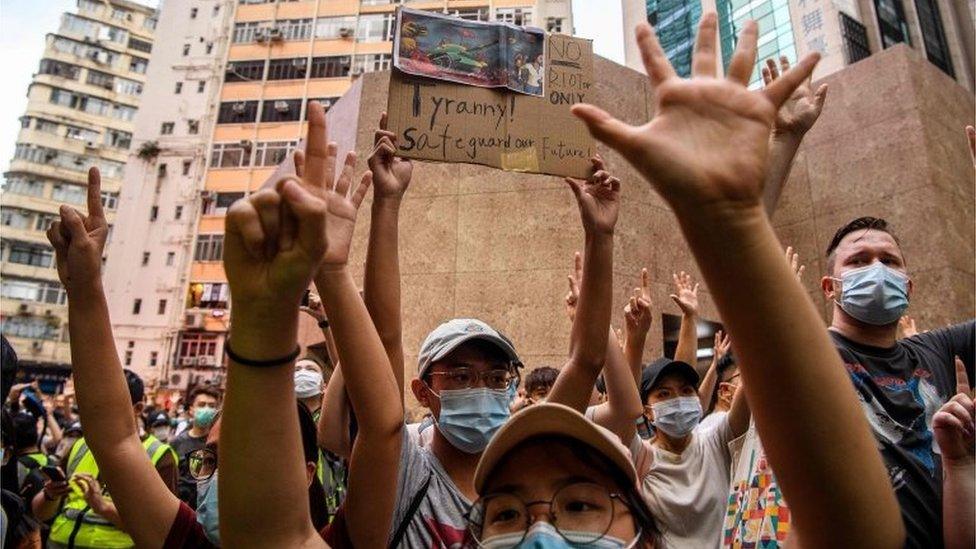Hong Kong protest singers fear for their future
- Published
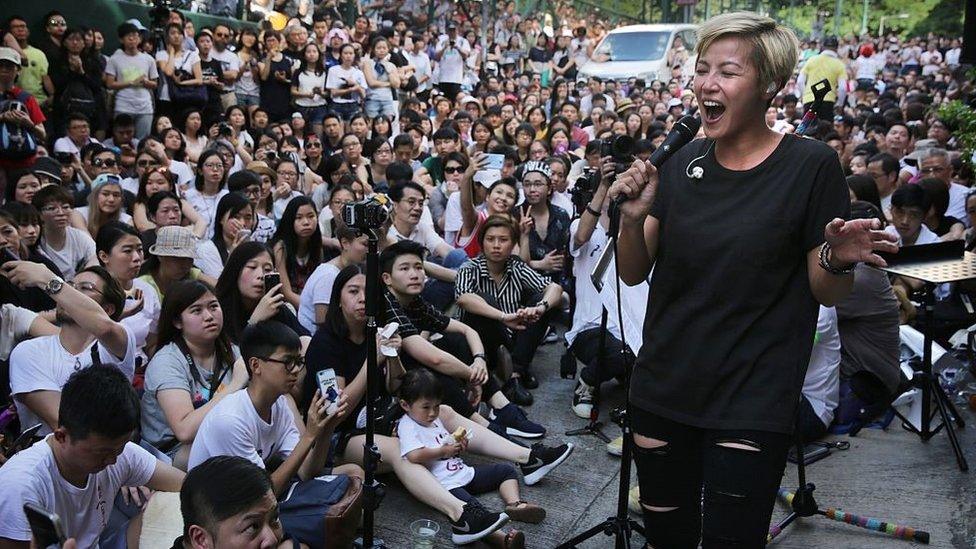
Pop star Denise Ho has become an icon of the pro-democracy movement
"It feels like we're not in the Hong Kong we knew anymore," says Denise Ho. "It feels more like we are in China."
Ho was once one of the biggest stars in Hong Kong. In the 2000s she was also becoming a major name in Cantopop on mainland China, where she would play to sell-out crowds across the country.
That all changed in 2014 when she took part in pro-democracy protests in Hong Kong and became one of the faces of the movement. She was immediately blacklisted by the Chinese government.
But Ho became an icon of resistance to Beijing in Hong Kong, playing shows with relative freedom and contributing to the soundtrack of the pro-democracy movement.
Such behaviour has just become far more dangerous.
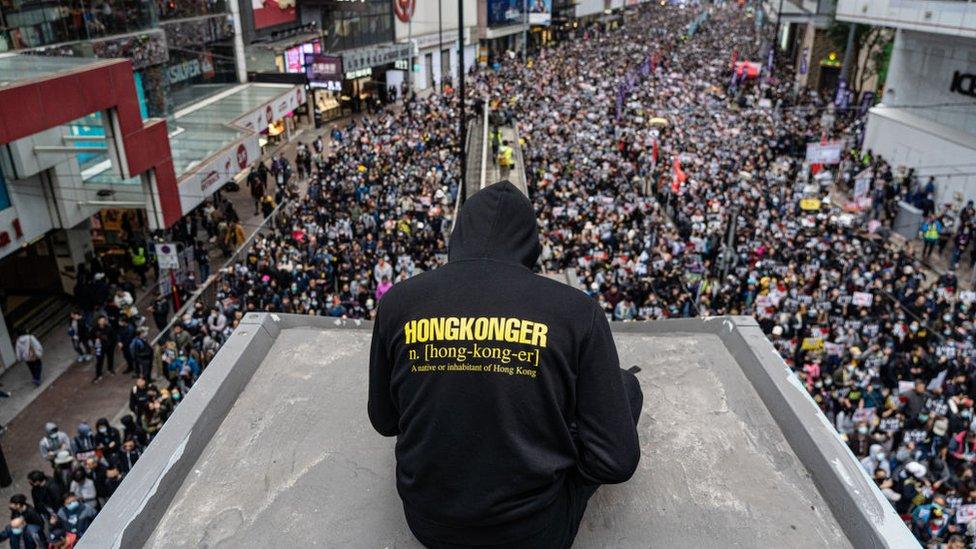
The mass pro-democracy protests that ripped through the city last year have ground to a halt
On 30 June, Beijing passed a new security law for Hong Kong, a former British colony which is now part of China, but which was given unique freedoms before a transfer of sovereignty in 1997. Many fear the new law has altered the face of Hong Kong forever.
Vaguely worded clauses on criminalising subversion, secession and collusion with foreign forces carry sentences of up to life in jail. Critics of Beijing have already been detained for alleged infractions including posting in support of independence on social media, carrying separatist stickers, external or holding blank sheets of paper., external
Among the high profile arrests so far are business tycoon Jimmy Lai and youth activist Agnes Chow.
'People will be more careful'
All of this is having a chilling effect on Hong Kongers.
Many are deleting past Facebook posts critical of the government. Books by pro-democracy figures have been removed from public libraries. Activists dare not chant independence slogans after the government warned such words could be in violation of the law.
For Hong Kong's outspoken musicians, the implications could be huge.
"It's a very difficult situation right now for basically anyone living in Hong Kong who has been vocal about the pro-democracy movement," Ho told the BBC.
"Of course, people will start to be much more careful than before, myself included," she adds.
100 Women: Denise Ho, the canto-pop singer who defied Beijing
Musicians and artists are going to have to "figure out where the grey area lies", Ho says.
"You have to deliver in smarter ways so that they cannot either oppress you or use the national security law on your work," she says. "For sure, people are thinking that things have to be done differently."
But rather than self-censoring, Ho believes Hong Kong's musicians will need to become more cryptic in their criticism. She points to how some people have already started replacing the words of Glory to Hong Kong - the unofficial anthem of last year's protests - with specially chosen numbers in Cantonese.
Allow YouTube content?
This article contains content provided by Google YouTube. We ask for your permission before anything is loaded, as they may be using cookies and other technologies. You may want to read Google’s cookie policy, external and privacy policy, external before accepting. To view this content choose ‘accept and continue’.

The author of Glory to Hong Kong - who goes under the pseudonym "Thomas dgx yhl" - tells the BBC of his joy at hearing his anthemic song bellowed out by hundreds of thousands of people on the streets of Hong Kong last year.
"It really was more powerful than I had thought. I could feel the connection between one another, and the same goal that we share linking us together: hope for freedom and democracy," he writes in a message.
But he acknowledges that the national security law could cause him problems. Glory to Hong Kong was banned from being played or sung in the city's schools last month., external
"Although the song was released way before the new law was enacted, popular slogans were introduced into the lyrics. Officials claimed those slogans carry different meanings now, and may be found guilty under the new law," he says.

Hong Kong's new security law
THE TEXT: What it is and why Hong Kong is worried
WHAT COULD HAPPEN: Life sentences for breaking the law and more
RESIDENTS REACT: 'End of one country, two systems'
PRO-DEMOCRACY MOVEMENT: Minutes after new law, voices quit

Songwriter Lo Hiu-pan penned Raise the Umbrella, a song that became an anthem of Hong Kong's 2014 pro-democracy protests. He says the song had caused him problems even before the national security law.
Pan, as he is better known, says he composed a song for a pop star that was due to be used in a Chinese film. But her management then contacted Pan voicing concerns that the song could lead to both the film and the artist getting banned on the mainland. They suggested using a pseudonym like "Penny" or "Pencil" rather than his name.
"I certainly refused and thought it's an insult. Finally, they decided to replace it with another song," he says.
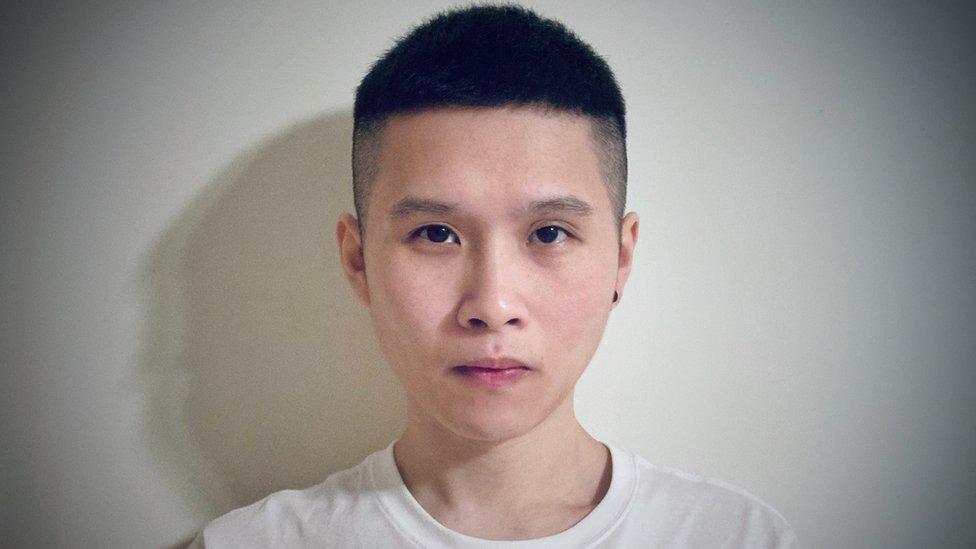
Lo Hiu-pan wrote a song that became an anthem of Hong Kong's 2014 pro-democracy protests
Pan believes that politically outspoken musicians could become increasingly shunned in the wake of the new law.
"I think there will only be more people unwilling to co-operate with the musicians who do not make concessions. People didn't want to take the risk before, let alone in the future," he says.
"Some people will even take the initiative to praise everything about [the Communist Party of China] and China in order to get some benefits."
All of this will naturally result in a muzzling effect on the city's music scene, Pan predicts.
Allow YouTube content?
This article contains content provided by Google YouTube. We ask for your permission before anything is loaded, as they may be using cookies and other technologies. You may want to read Google’s cookie policy, external and privacy policy, external before accepting. To view this content choose ‘accept and continue’.

"For it may break the law, there will be more musicians - including independent artists - who dare not to write political songs and songs with social messages," he says, adding that some will leave Hong Kong and others may hide their identity.
'We'll find ways to get to the audience'
It's also not clear what the new law could mean for live shows.
Denise Ho says she was not permitted to play the 12,500 capacity Hong Kong Coliseum last year and "can foresee that it could be many, many more times harder for me to get a venue".
"We do need to think of different ways to perform. I do think that it's possible virtually or working within these grey areas of this law. I don't have an answer yet but I'm pretty confident that we'll be able to find different ways to get to the audience."
Beijing says freedom of speech is protected by the new law.
"People in Hong Kong can still criticise the Communist Party of China after the handover," Zhang Xiaoming, deputy director of the Chinese government's Hong Kong and Macau Affairs Office, told reporters last month. "However, you cannot turn these into actions."
Hong Kong's top official Carrie Lam has insisted that the law only targets an "extremely small minority of illegal and criminal acts and activities".
But Prof Johannes Chan, a legal scholar at the University of Hong Kong, said law's definition of subversion "is so wide that it could cover anything which remotely threatens stability".
"This will be hard on the musicians and artists, as the room for creativity is inevitably stifled," he said.
"At the end of the day, it is not whether they have committed an offence, but the mere possibility of an arrest will... lead to all kinds of self-censorship."
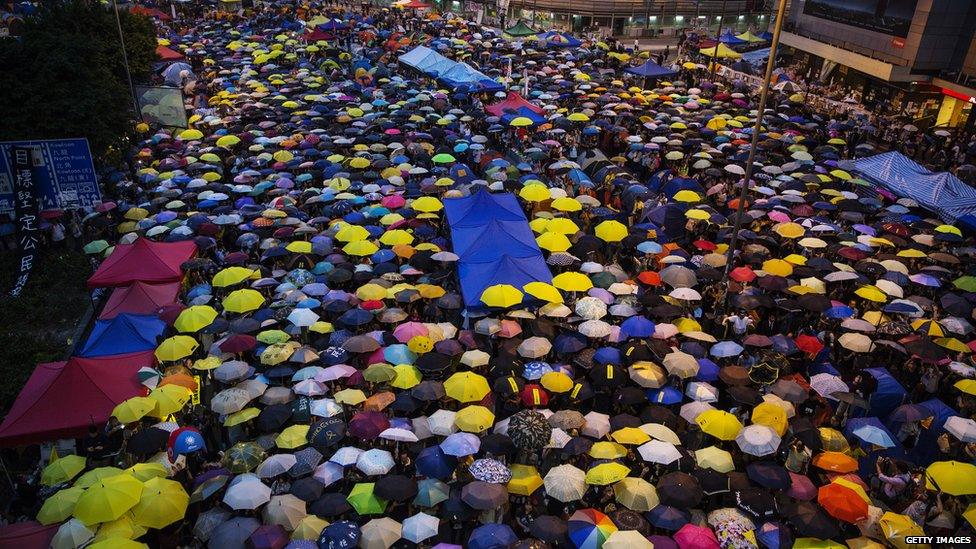
Tens of thousands of people shut down the centre of Hong Kong in October 2014
Despite this, all the artists who spoke to the BBC said they planned to continue doing what they love.
Thomas, author of Glory to Hong Kong, says it would be hard for him to turn his back on tackling politics in his songs.
"I think most artists are influenced by their surroundings, in other words, society and politics," he says. "It is hard not to create artwork without any political content."
Denise Ho says it is not time to pull the plug on outspoken music in Hong Kong.
"The people who have chosen to stay in Hong Kong - including myself - we are still very determined. Throughout all these years, Hong Kongers have been learning how to treat this fight," Ho says.
"I think the power of the people should not be underestimated."
- Published30 June 2020
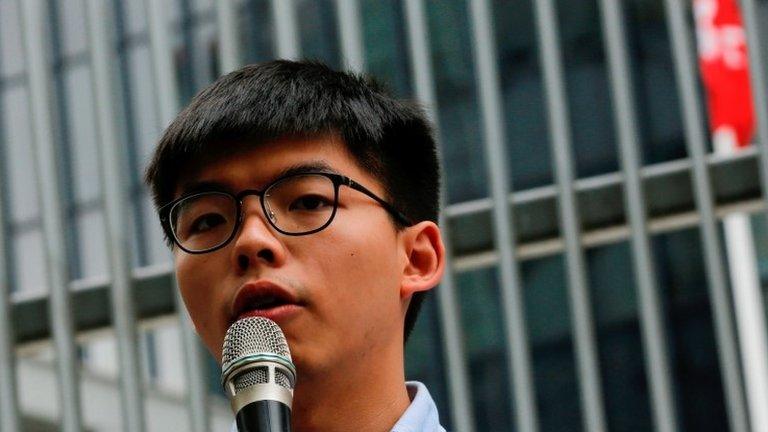
- Published10 August 2020
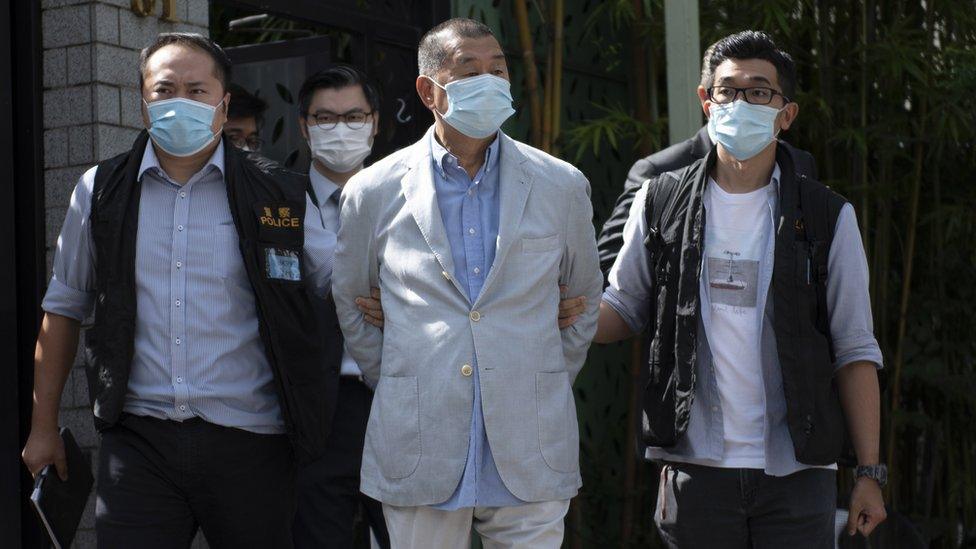
- Published5 July 2020
